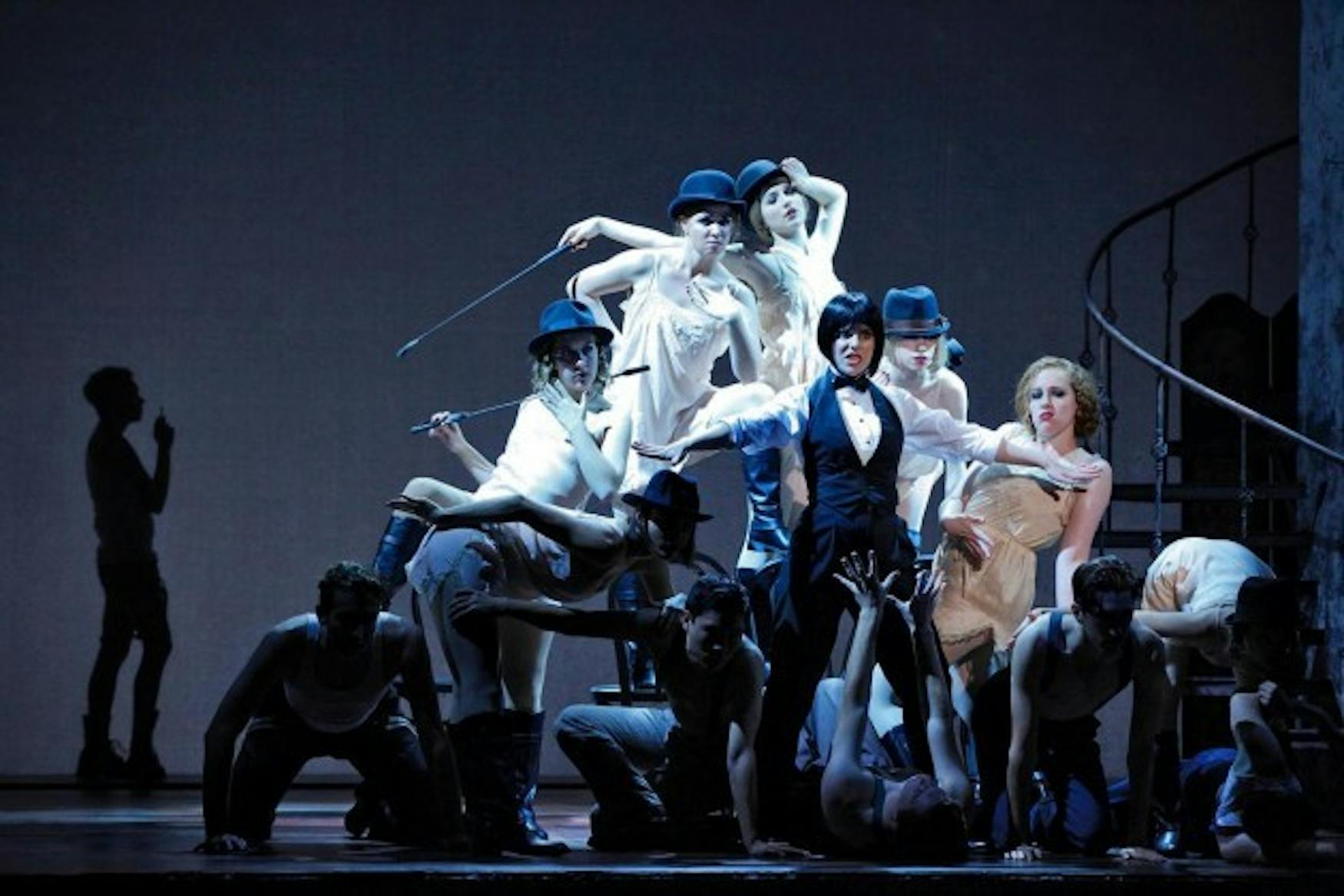Cabaret' transports to 1930s Berlin
Sexy, risqu?(c) and provocative are the three words I think of to describe Cabaret, a daring musical set in 1930s Berlin, Germany. The Brandeis Theater Company perfectly captured the seduction and tension of the musical during their production of it this weekend. Cabaret has a long performance history, dating back to its 1966 Broadway premiere in Manhattan, and is certainly an ambitious undertaking. The musical is arguably best known for actress Liza Minnelli's 1972 portrayal of Sally Bowles in the film adaptation.
The entire premise of the musical is fraught with tension between the growing power of the Nazi party in German government and the carefree, playful atmosphere of the Kit Kat Klub, a seedy cabaret venue. At the club, Sally Bowles (Laura Jo Trexler MFA '14) is the star singer accompanied by the outrageous Emcee (Eddie Shields MFA '14) and their six cabaret "girls."
The show opens with "Willkommen" featuring the Emcee who is joined by the ensemble. This number is a powerful and entertaining way to start the show, especially because it shows off Shields' ability to pull off the bombastic character of the Emcee, who radiates sexuality and energy. Throughout the musical, Shields draws the audience's eye in any scene he is in and his provocative antics tie together the entire musical. For the most part, Emcee is playful, making sexual gestures and innuendos and clearly enjoys himself as much as he enjoys performing for the cabaret audience. However, the song, "I Don't Care Much," is a break from this style and employs a more serious tone that jolts the audience out of its carefree state. Instead of the entertaining Kit Kat Klub, here, the Emcee shows true sorrow and pain, reflecting a shift in the mood of the musical as it transitions into the second act and the hold of the Nazis grows stronger.
Sara Schoch (MFA '14) also gave a notable performance as the older Fr?Sulein Schneider, who rents out rooms while also getting involved in the lives of her tenants. Her two solo numbers "So What" and "What Would You Do?" are highlights of the musical, spotlighting her acting performance as a woman caught between the choice of love or safety. Her beau, Herr Schultz (Jonathan Young MFA '14), is Jewish-bad news in the Nazi-dominated state. In one scene, Schultz gives Schneider a pineapple, launching into "It Couldn't Please Me More." From the pineapple-themed flapper outfits of the cabaret girls to the perfect performances of Young and Schoch, this is one of the most memorable scenes in the musical.
As Sally, Trexler did not disappoint with her powerful vocals and acting ability. Sally only wants to enjoy life, not want anything serious tying her down, and Trexler perfectly embodies her blithe nature. While performing at the Kit Kat Klub, she is usually accompanied by the girls, as in "Don't Tell Mama" and "Mein Herr," which had very different tones-the former was playful and the latter more serious-but both were excellent. "Cabaret," her final solo number, is another highlight of the show as she starts off exuberant and cheerful, but slowly devolves emotionally as she deals with the problems she encounters.
As for the cabaret girls, the six of them seemed to blend together throughout the show, but they all deliver exactly the performance the show requires. Their costumes, bland colored lingerie nightgowns, are perfect for their characters because the girls are, in a sense, provocative wallflowers that add diversity to the musical. During "If You Could See Her," The Emcee laments the challenges of loving a girl who everyone disapproves of. Frenchi (Victoria Dieck '17), one of the cabaret girls, wears a realistic gorilla mask as Emcee and the other girls dance around her. It isn't until the end of the number that the mask is taken off and her saddened, battered face is revealed while she stands motionless and silent. Tension and despair fills the stage and her silent performance captures the immensity of the moment and the dangers of a controlling society.
For its politicized themes and proactive entertainment, Cabaret is an ideal combination of intellectual and visual stimulation. By tackling such serious subject matter in a more relaxed fashion, the muscial results in a much deeper meaning that demands the careful analysis and consideration of the audience-especially considering it was originally released at the height of the Cold War in the aftermath of World War II. Brandeis Theater Company has once again proven their capability to produce a wide range of quality theater performances in a skilled manner.



Please note All comments are eligible for publication in The Justice.